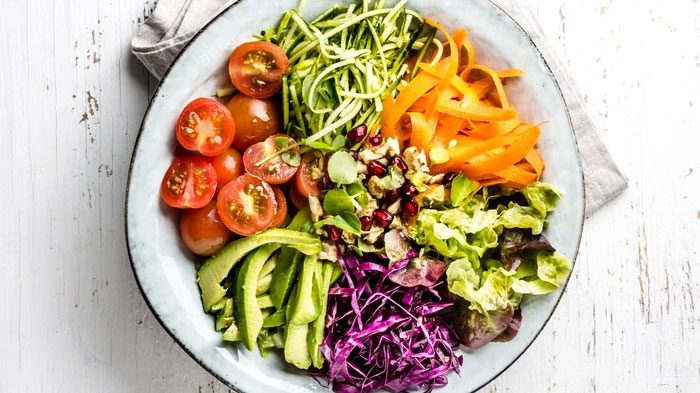There is no one-size-fits-all diet; to create a successful eating plan, individuals need to consider their health status, preferences, and personal circumstances. Currently, the raw vegan diet is becoming popular and is chosen by many. However, there are still numerous debates surrounding this dietary approach.
1. What is a Raw Vegan Diet?
The raw vegan diet is a type of vegan diet that excludes all animal products, such as milk, cheese, eggs, meat, and fish. In this diet, foods are consumed in their raw form or heated at temperatures below 40-48°C. Common preparation methods for this eating style include juicing or blending, soaking, mixing, and sprouting.
The raw vegan diet is typically rich in fruits, vegetables, nuts, seeds, sprouted grains, and legumes. Some adherents of the raw vegan diet believe that this method provides all the nutrients humans need.

The raw vegan diet does not contain animal-related foods and is consumed raw. (Image: Internet).
2. Benefits of a Raw Vegan Diet
The raw vegan diet primarily consists of nutrient-rich plant foods. Therefore, this method offers numerous health benefits.
2.1. Improves Cardiovascular Health
The raw vegan diet is believed to offer many benefits for heart health due to its high fruit content. Research indicates that increasing fruit and vegetable intake from less than 3 servings per day to over 5 servings is associated with a 17% reduction in the risk of heart disease.
Additionally, the raw vegan diet includes many other heart-healthy foods such as:
- Legumes: Increasing legume consumption can reduce the risk of heart disease.
- Whole grains: A higher intake of whole grains can lower the risk of chronic diseases, including heart disease.
- Nuts: Consuming nuts can reduce risk factors contributing to heart disease.
Studies also show that those who follow a vegan diet may reduce their risk of hypertension by up to 75%.
2.2. Reduces the Risk of Diabetes
A 2009 study found that people following a vegan diet nearly halved their risk of developing type 2 diabetes compared to non-vegetarians. This is attributed to the diet’s high content of fruits, legumes, nuts, and whole grains, which are rich in fiber—a nutrient linked to reduced blood sugar levels and increased insulin sensitivity.

Vegan eaters may reduce the risk of type 2 diabetes. (Image: Internet).
2.3. Supports Weight Loss
Many people choose the raw vegan diet to maintain their figure and lose weight. According to research, over a span of 3.7 years, those on a raw vegan diet lost between 9.9 to 12 kg. However, about 14-25% of the participants in the study became underweight.
Furthermore, some high-quality studies report that low-fat vegan diets—including the raw vegan approach—are particularly effective for weight loss.
2.4. Good for Digestive Health
The high fiber content of plant foods in the raw vegan diet can help improve digestive health. Notably, this diet contains both soluble and insoluble fiber.
Insoluble fiber adds bulk to stool and helps food move more quickly through the intestines, reducing constipation.
Soluble fiber is also beneficial as it feeds good bacteria in the gut. These bacteria can improve symptoms of irritable bowel syndrome (IBS), Crohn’s disease, and ulcerative colitis.
3. Dangers and Risks of a Raw Vegan Diet
While it is known to have many health benefits, the raw vegan diet may not be suitable for everyone and can pose several health risks if not planned appropriately.
3.1. Nutritional Imbalance
The raw vegan diet is primarily plant-based, and many people adopt this diet without creating a diverse meal plan, leading to a risk of deficiencies in essential vitamins and minerals.
A 2019 study reported that the raw vegan diet might not provide adequate amounts of protein, vitamin B12, vitamin D, iron, calcium, selenium, and zinc. The study also noted that cooking helps break down fibers and cell walls in foods, which can enhance their nutritional value in some cases.
Additionally, a 2005 study found that 38% of participants following a raw food diet were deficient in vitamin B12. A deficiency in vitamin B12 can lead to various health issues such as jaundice, glossitis, mouth ulcers, depression, mood changes and behavioral issues, and memory loss.

The raw vegan diet increases the risk of deficiencies in essential vitamins and minerals. (Image: Internet).
3.2. May Cause Muscle and Bone Weakness
For beginners, this diet tends to be low in calcium and vitamin D—two essential nutrients for strong bones. One study found that those on a raw vegan diet had lower mineral content and bone density than standard levels.
Moreover, the raw vegan diet often provides very little protein—typically less than 10% of total daily calories. While theoretically, such a low protein level may meet basic biological needs, some evidence suggests that a higher protein intake may contribute to stronger bones.
Protein is also crucial for maintaining muscle mass, especially during periods of low-calorie intake such as this diet.
3.3. Increases the Risk of Tooth Decay
Due to the high intake of citrus fruits and berries in the raw vegan diet, these fruits are believed to be more acidic and more likely to cause enamel erosion.
In one study, 97.7% of raw vegan dieters experienced some level of tooth erosion, compared to only 86.8% in the control group. However, more research is needed before definitive conclusions can be drawn.
3.4. Affects Reproductive Health
Studies show that women following a raw vegan diet may experience menstrual irregularities such as amenorrhea. This may occur due to the low-calorie nature of the diet, which impacts body weight.
3.5. Risk of Food Poisoning and Parasite Infection
Eating uncooked foods also poses a risk of food poisoning, possibly due to pesticide residue if one does not choose clean foods or fails to wash hands thoroughly during preparation, allowing bacteria to enter the food.
Additionally, fruits and vegetables may harbor parasites, especially when grown in polluted environments. If not cooked, these parasites can survive and directly enter the human body.
In conclusion, while the raw vegan diet can be beneficial for health, individuals need to have a well-planned eating approach and avoid extreme dietary practices. When adopting this diet, one should be aware of their health condition and gradually adjust to allow the body to adapt. Some experts do not recommend following a raw vegan diet for an extended period, so consider creating a dietary plan that suits you.


















































